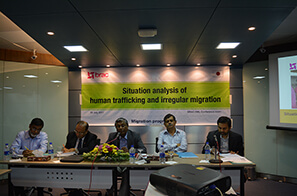
Bangladesh in image crisis for human trafficking and irregular migration to Europe in sea routes
Trafficking godfathers must be caught: NHRC chair
Bangladesh is now among the top countries of origin for illegal immigrants in Europe. In the first six months of the current year (2017), 7,899 illegal Bangladeshi migrants entered Europe through the Mediterranean Sea route only, according to Frontex, an organisation of European Council working to coordinate between the border security forces of European Union member countries.
Speakers revealed this information at a consultation meeting today on Saturday (29 July 2017) at BRAC Centre Inn. Development organisation BRAC organised the event titled 'Situation analysis of illegal trafficking and irregular migration' on the occasion of World Day against Trafficking in Persons.
Kazi Reazul Hoque, chairman, National Human Rights Commission Bangladesh, was present at the programme as the chief guest.
Chaired and moderated by Asif Saleh, senior director, strategy, communication and empowerment, BRAC and BRAC International, the event was also attended, among others, by Jabed Ahmed, additional secretary, expatriates welfare and oversees employment ministry, C R Abrar, professor, International Relations, Dhaka University, also coordinator of Refugee and Migratory Movements Research Unit (RMMRU), and Shah Alam, Additional Deputy Inspector General of CID. Representatives of different development organisations, senior police officers and senior journalists were also present at the meeting.
Md Shariful Hasan, programme head, BRAC Migration Programme, presented the keynote article at the event. Analysing the situation from different angles he said that there is no definite statistics about the exact number of Bangladeshis currently staying illegally in Europe. However, a European Union delegation during their Dhaka visit in this April stated that around 80 thousand illegal Bangladeshi migrants are currently stating in Europe. The European Commission statistics office Eurostat states that in 2008-2015 period 93,435 Bangladeshis were staying illegally in the European countries. This number should cross 100 thousand if the account of the first six years of current year is added to 2008-2015 account.
NHRC chair Kazi Reazul Hoque at the programme said, 'It is true that we have an excellent law formulated in 2012. About the same time law was passed against money laundering. But certainly question is there about the extent of their proper implementation.'
'According to the police, only 30 convicts have been given life imprisonment so far out of 3500 human trafficking cases,' he further said, observing pointing out a number of weaknesses in the present manner of dealing with such cases. 'Many times the court does not have anything to do against the perpetrators because the police give flawed reports.' 'No matter how the incidents took place it is our responsibility to protect human rights,' the NHRC chair stressed, 'the state must take responsibility'. He suggested that the government may undertake making a shortlist of 25 top 'godfathers' to chase and nab them.
Professor C R Abrar said, 'We must keep in mind that the human traffickers in both country and abroad are a highly powerful coterie. We have to be have sufficient preparation to bring them to book.'
Expatriate welfare additional secretary Jabed Ahmed said, 'Reducing the cost of migration is still the biggest challenge. When someone migrates spending an excess amount of money, in the urge of recovering that expenses many times they become irregular.'
He stressed on strong coordination among the home ministry, foreign affairs ministry, commercial aviation and other relevant ministries to prevent human trafficking.
BRAC senior director Asif Saleh presented the recommendations of the consultation meeting, saying 'We should focus on four main issues to prevent human trafficking: Ensuring accountability of the law enforcement agencies, utrilising the mass media to raise mass awareness, ensuring follow-up of legal cases and ensuring strong coordinator among the relevant ministries.'
Expatriates welfare and oversees employment ministry's deputy chief K M Ali Reza, development practitioner Asif Munir, additional police super of anti-human trafficking cell of Bangladesh Police Masura Begum, and Rapid Action Battalion deputy director Abdullah Al Maruf also spoke among others.
Speakers also told the meeting that in the early July this year around 2,000 illegally travelling Bangladeshis have become stuck in Turkey en route to Europe. The scenario becomes even bleaker when the illegal travel to Malaysia and Thailand through dangerous sea routes and the mass graves recently discovered in those countries are considered. Malaysia has already started its operation against illegal immigrants, while Saudi Arabia is taking its preparation. According to the expatriates welfare and oversees employment ministry, around 800 thousand (8 lakh) Bangladeshi migrants returned for lacking legal documents.
The speakers further said Bangladesh's status in the annual report of the US foreign affairs ministry published this has gone one step down. In this report the relevant countries are divided in three tiers. In last five years Bangladesh was in Tier-2, while this year it has been positioned one step down to Tier-2-Watch List along with 45 other countries including Saudi Arabia, Algeria, Pakistan, Thailand and Hong Kong. This scenario is a really worrying one particularly at this juncture when Bangladesh is poised for upgrading itself to a middle-income country and aspires to establish a strong safe migration process.
Referring to International refugee Organisation, the speakers said in last ten years around 150 thousand Bangladeshis have been the victim of illegal trafficking through Bay of Bengal routes. Of then at least 1500 died in the sea. Of the over 200 dead bodies recovered from the mass graves of Malaysia and Thailand, many were of Bangladeshi citizens. According to the information from the Bangladesh foreign affairs ministry and International Organisation for Migration (IOM), the government returned 2,183 Bangladeshis, of whom 183 are children. According to the police headquarters, since the Prevention and Suppression of Human Trafficking Act, 2012 was passed around 3500 cases were filed. But the victims complain that most of these cases are seriously delayed.









